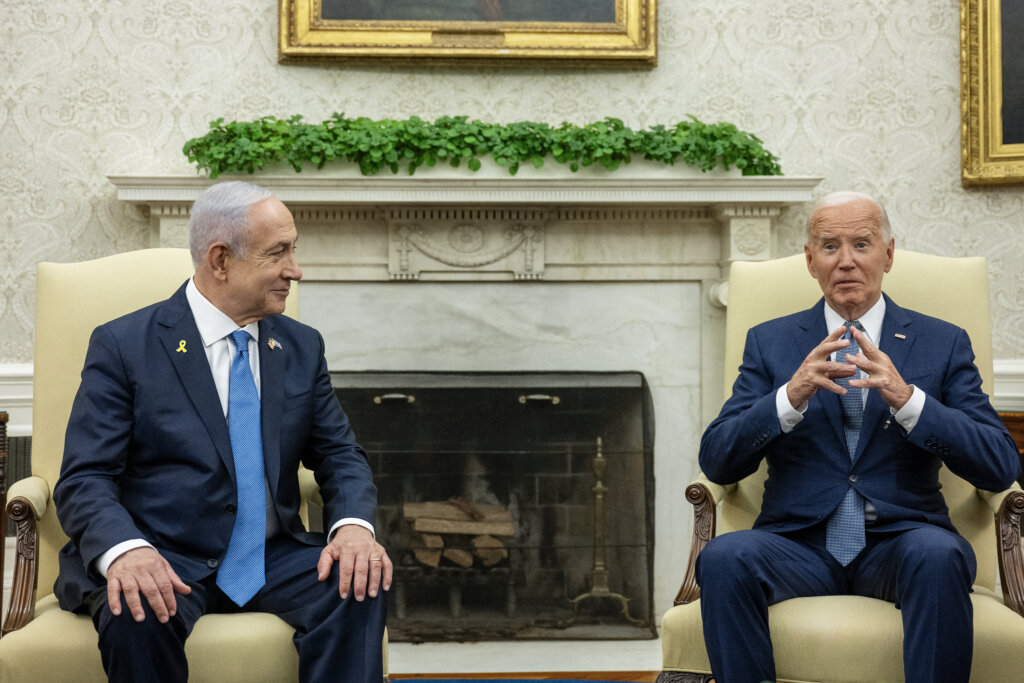How a lame-duck Joe Biden could end the Israeli-Palestinian conflict
His Oval Office speech offers a blueprint: Reject fear, choose moving forward, presidents are not kings.

President Joe Biden, right, and Israeli President Benjamin Netanyahu in the Oval Office on Thursday, July 25, 2024. Photo by Samuel Corum/Sipa/Bloomberg via Getty Images
In this week and month and year of unprecedented news events, I invite you to suspend disbelief for the time it takes you to read this column and consider one more: Joe Biden devotes his lame-duck presidency to not just ending the war in Gaza and bringing home the hostages, but forging a lasting Middle East peace.
Biden, in bowing out of the 2024 race, has already done the hardest thing for any politician to do. So why not take a stab at the hardest geopolitical thing?
There are a zillion good reasons, of course. The intransigence of Prime Minister Benjamin Netanyahu. The utter vacuum of leadership and accountability among Palestinians. The explosive, complicated politics around the war among U.S. Democrats during this most critical campaign. The historic weakness of the lame duck. Fear of failure.
And there are at least two reasons why Biden should try anyhow: It’s what the world needs — and he might just be the only one who has a shot.

A “lame duck,” in the wild, is hopelessly vulnerable to predators, left alone in an open field because she is unable to keep pace with the other ducks.
The internet advises that the term was first applied to humans not in politics but finance, to describe a stockbroker who defaulted on his debts. Horace Walpole, the fourth Earl of Orford —who Wikipedia describes as “an art historian, man of letters, antiquarian and Whig politician” — apparently invoked it in a 1761 letter to Sir Horace Mann, who the same source says was “a patron of Kent cricket.” The phrase was transferred to “broken-down politicians” a century later, in 1863.
Calvin Coolidge is said to be the first U.S. president to whom the term was applied, and soon after his term ended in 1929, the Constitution was amended in 1933 to shorten the lame-duck period by moving inaugurations back from March to January.
Lame-duck presidents famously issue pardons of controversial convicts, freed from any ballot-box repercussions. They also often try to shore up their legacies with semi-bold executive orders. They generally have less luck pushing legislation through Congress and, I’m sad to report, trying to resolve intractable problems with recalcitrant world leaders.
“Traditionally, it has been the most frustrating period of a president’s time in office,” my friend and former colleague Peter Baker, who has covered the last five presidents for The New York Times, wrote this week. “The spotlight turns toward potential successors; lawmakers would rather rush home to campaign than pass major legislation; and world leaders strategize over how to deal with the next administration while looking for ways to make introductions.”
In search of precedent or inspiration, I reached out to Prof. Steven M. Gillon, who taught me American political history at Yale and is now at the University of Oklahoma. He offered two examples: Lyndon Johnson trying to get a ceasefire in Vietnam after bowing out of the 1968 race, and Ronald Reagan pursuing an arms-control treaty with the Soviets in his final year in the White House.
“His motives were both altruistic and practical,” Gillon said of Johnson, who was both thinking about his legacy and how to help the Democrats win in November. “The twist, however, is that Nixon sabotaged the effort by telling the South Vietnamese government to reject the deal, telling them he would offer a better deal.”
Of Reagan, Gillon said: “His actions were certainly bold — he went against the united recommendations of his entire foreign policy establishment, conservative pundits, and right-wing think tanks.”
Neither effort worked, of course. But what if President Biden acted not like a lame duck but as a freed flamingo?

Flamingos have long legs but small feet. The can fly — up to 20,000 feet and 40 miles per hour, the internet advises — and a group of them is called a flamboyance, a fun fact I just love. They are adorable in their awkwardness, and can also be quite fierce. They eat algae and shrimp and have adapted to live in extreme conditions. Pick your metaphor.
Along with Gillon, I reached out this week to Michael Oren, who is both a student of Middle East history — PhD from Princeton — and a person who has lived it (Israeli paratrooper in the 1982 Lebanon War, Israeli ambassador to the U.S. a decade ago). Oren was more than dubious about Biden’s prospects of ending the conflict — “How?” he kept asking (see “zillion good reasons” not to try, above).
I — and Biden, and most experts on the region — actually think the how is fairly straightforward: Two states for two indigenous peoples, with security guaranteed by some international force; democratic and human rights for everybody; normalization of relations between Israel and the broader Arab world; isolation and punishment of terror groups and their patron, Iran. But “how” is also the wrong question right now. The right question is “why?”
Why should Biden pick this, of all things, to fill the final days of his remarkable half-century of public service?
The short-term answer is the sheer suffering: The staggering death toll and starvation in Gaza; the horrifying number, 293, that Rachel Goldberg-Polin has taped to her shirt symbolizing the days her son, Hersh, and more than 100 others have been held in captivity by Hamas. It needs to end.
Longer-term, the “why,” at least for most American Jews and non-Jewish Zionists like Biden, is to preserve Israel’s future as a Jewish and democratic state. As I have argued before, the conflict with the Palestinians is Israel’s to solve because if it stretches into its second century, international isolation and demographic destiny will inevitably turn the place into Palestine.
Netanyahu may think, like the Vietnamese in Johnson’s era and the Soviets in Reagan’s, that he’ll have a better shot with the next occupant of the Oval Office. But former President Donald Trump is a fair-weathered friend to Israel, happy to move the embassy but fundamentally an isolationist who won’t foot the bill for a forever war. And while Vice President Kamala Harris pledged support for Israel’s security after meeting with Netanyahu yesterday, she also made clear her sympathy for the Palestinians, saying “we cannot look away” from the tragedy in Gaza, “and I will not be silent.”
Biden himself said on Monday, the day after his announcement that he would no longer seek reelection, that he would devote the next six months to ending the war in Gaza and bringing Hersh and the other hostages home.
As I watched the president’s Oval Office address to the nation on Wednesday night, I was at first disappointed to see him list Gaza second-to-last on a laundry list of a dozen lame-duck to-dos, behind the economy, gun violence, climate crisis, Supreme Court reform, Ukraine and a bunch more. But if you squint a little, you can see in Biden’s rationale for stepping aside — for doing that hardest of political things — a hint of a roadmap to climb that seemingly impossible geopolitical mountain.
“Presidents are not kings,” he said. That includes Prime Minister Netanyahu and Palestinian President Mahmoud Abbas, who just finished the 19th year of his four-year-term.
“Reject fear,” Biden advised. Fear is the main obstacle to Middle East peace.
“Choose between moving forward and backward,” he demanded. The only choice for Israel and the Palestinians is a deal that focuses on the future, not the dueling narratives of the past.
“We are a great nation because we are good people,” he said, meaning America and Americans, but equally applicable to Israel and the Jews. “The sacred cause of this country is larger than any one of us.” He could be talking to you, Mr. Netanyahu. And, finally, “history is in your hands.”
Biden upended history on Sunday with his unprecedented announcement. The next six months are in his hands. Fly, fierce flamingo, fly.
Correction: The original version of this article misstated the year President Lyndon Johnson chose not to seek reelection. It was 1968, not 1964.
The Forward is free to read, but it isn’t free to produce

I hope you appreciated this article. Before you go, I’d like to ask you to please support the Forward.
Now more than ever, American Jews need independent news they can trust, with reporting driven by truth, not ideology. We serve you, not any ideological agenda.
At a time when other newsrooms are closing or cutting back, the Forward has removed its paywall and invested additional resources to report on the ground from Israel and around the U.S. on the impact of the war, rising antisemitism and polarized discourse.
This is a great time to support independent Jewish journalism you rely on. Make a gift today!
— Rachel Fishman Feddersen, Publisher and CEO
Support our mission to tell the Jewish story fully and fairly.
Most Popular
- 1

Culture Cardinals are Catholic, not Jewish — so why do they all wear yarmulkes?
- 2

News School Israel trip turns ‘terrifying’ for LA students attacked by Israeli teens
- 3

Fast Forward Ye debuts ‘Heil Hitler’ music video that includes a sample of a Hitler speech
- 4

Fast Forward Student suspended for ‘F— the Jews’ video defends himself on antisemitic podcast
In Case You Missed It
-

Yiddish קאָנצערט לכּבֿוד דעם ייִדישן שרײַבער און רעדאַקטאָר באָריס סאַנדלערConcert honoring Yiddish writer and editor Boris Sandler
דער בעל־שׂימחה האָט יאָרן לאַנג געדינט ווי דער רעדאַקטאָר פֿונעם ייִדישן פֿאָרווערטס.
-

Fast Forward Trump’s new pick for surgeon general blames the Nazis for pesticides on our food
-

Fast Forward Jewish feud over Trump escalates with open letter in The New York Times
-

Fast Forward First American pope, Leo XIV, studied under a leader in Jewish-Catholic relations
-
Shop the Forward Store
100% of profits support our journalism
Republish This Story
Please read before republishing
We’re happy to make this story available to republish for free, unless it originated with JTA, Haaretz or another publication (as indicated on the article) and as long as you follow our guidelines.
You must comply with the following:
- Credit the Forward
- Retain our pixel
- Preserve our canonical link in Google search
- Add a noindex tag in Google search
See our full guidelines for more information, and this guide for detail about canonical URLs.
To republish, copy the HTML by clicking on the yellow button to the right; it includes our tracking pixel, all paragraph styles and hyperlinks, the author byline and credit to the Forward. It does not include images; to avoid copyright violations, you must add them manually, following our guidelines. Please email us at [email protected], subject line “republish,” with any questions or to let us know what stories you’re picking up.
















